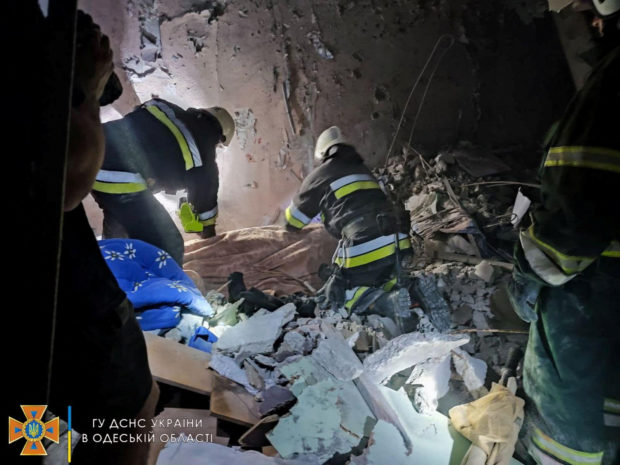Russian missile strikes near Ukraine’s Odesa kill 21

Rescue workers work at the scene of a missile strike at a location given as Bilhorod-Dnistrovskyi, Odesa region, Ukraine, in this handout image released July 1, 2022. (State Emergency Services of Ukraine/Handout via REUTERS)
SERHIIVKA, Ukraine -Russia flattened part of an apartment building while residents slept on Friday in missile attacks near Ukraine’s port of Odesa that authorities said killed at least 21 people, hours after Russian troops abandoned the Black Sea outpost of Snake Island.
Residents in the resort village of Serhiivka helped workers pick through the rubble of the nine-storey apartment block, a section of which had been destroyed in the early-morning strike.
Walls and windows of a neighbouring 14-storey apartment block were damaged by the blast wave. Nearby holiday camps were also hit.
“We came here to the site, assessed the situation together with emergency workers and locals, and together helped those who survived. And those who unfortunately died. We helped to carry them away,” said Oleksandr Abramov, who lives nearby and had rushed to the scene when he heard the blast.
Serhiy Bratchuk, spokesman for the Odesa regional administration, said 21 people had been confirmed killed, including a 12-year-old boy. Among the fatalities was an employee of the Children’s Rehabilitation Center set up by Ukraine’s neighbour Moldova in the resort.
The regional governor said the missiles had been fired from the direction of the Black Sea.
The Kremlin denied targeting civilians.
“I would like to remind you of the president’s words that the Russian Armed Forces do not work with civilian targets,” Kremlin spokesperson Dmitry Peskov said.

LONG-RANGE ATTACKS INTENSIFY
In his nightly video address on Friday, Ukrainian President Volodymyr Zelenskiy denounced the strike on the apartments and seaside site as “conscious, deliberately targeted Russian terror and not some sort of error or a coincidental missile strike.”
The strike on Serhiivka took place shortly after Russia pulled its troops off Snake Island, a strategically important outcrop about 140 km (85 miles) southeast of Odesa that it seized on the war’s first day.
Odesa spokesman Bratchuk accused Russia of failing to abide by its assertions that it had left Snake Island as a “gesture of good will”. On his Telegram channel, Bratchuk said two Russian warplanes had taken off from a base in Crimea and bombed targets on the island on Friday evening.
He posted a video of what he said was the attack. Reuters had no way of confirming the video or the Russian action. There was no immediate Russian comment.
Earlier this week, Russia struck a crowded shopping mall in central Ukraine, killing at least 19 people.
Kyiv says Moscow has intensified its long-range missile attacks, hitting civilian targets far from the frontline. Russia says it has been aiming at military sites.
Thousands of civilians have been killed since Russia invaded Ukraine on Feb. 24. Russia calls the invasion a “special operation” to root out nationalists. Ukraine and its Western allies say it is an unprovoked war of aggression.
In southern Ukraine, Russian forces have occupied the Zaporizhzhia nuclear plant, Europe’s largest, since March. On Friday, Ukraine’s nuclear power operator said it had re-established its connection to surveillance systems there that had been cut off. Communications have been lost twice since March and the U.N.’s atomic watchdog wants to inspect the plant.
FOOD SUPPLY
Russia forces had used Snake Island to control the northwestern Black Sea and impose a blockade on Ukraine, one of the world’s biggest grain exporters.
Moscow denies it is to blame for a food crisis, which it says is caused by Western sanctions hurting its own exports.
Russian President Vladimir Putin met the president of Indonesia on Thursday and spoke by phone on Friday to the prime minister of India, promising both major food importers that Russia would remain a big supplier of grain.
Ukraine has accused Russia of stealing grain from the territories that Russian forces have seized since its invasion.
It said a Russian-flagged cargo ship, the Zhibek Zholy, had left the Russian-occupied port of Berdyansk with a cargo of Ukrainian grain. Kyiv requested that Turkey detain the vessel, according to a Ukrainian official and document seen by Reuters.
A Russian-installed official said on Thursday that after a stoppage of several months the first cargo ship had left Berdyansk port but he did not name the Zhibek Zholy.
The Kremlin has previously denied stealing grain and did not reply to requests for comment on Friday.
NO GAS, ELECTRICITY, WATER
Russia’s stepped up campaign of missile attacks on Ukrainian cities coincides with its forces grinding out success on the battlefield in the east, with the aim of forcing Ukraine to cede Luhansk and Donetsk provinces.
Moscow has been on the verge of capturing Luhansk since taking the city of Sievierodonetsk last week after some of the heaviest fighting of the war.
Ukraine’s last bastion in Luhansk is the city of Lysychansk across the Siverskyi Donets river, which is close to being encircled under Russian artillery barrages.
In Russian-occupied Sievierodonetsk, residents emerged from basements to sift through the rubble of their city.
“Almost all the city infrastructure is destroyed. We are living without gas, electricity, and water since May,” Sergei Oleinik, 65, told Reuters.
More weapons were needed in both eastern and southern Ukraine, said Zelenskiy, as the Pentagon announced the United States was sending two NASAMS surface-to-air missile systems, four additional counter-artillery radars and ammunition as part of its latest arms package.
“We have worked very hard to have these supplied,” Zelenskiy said.